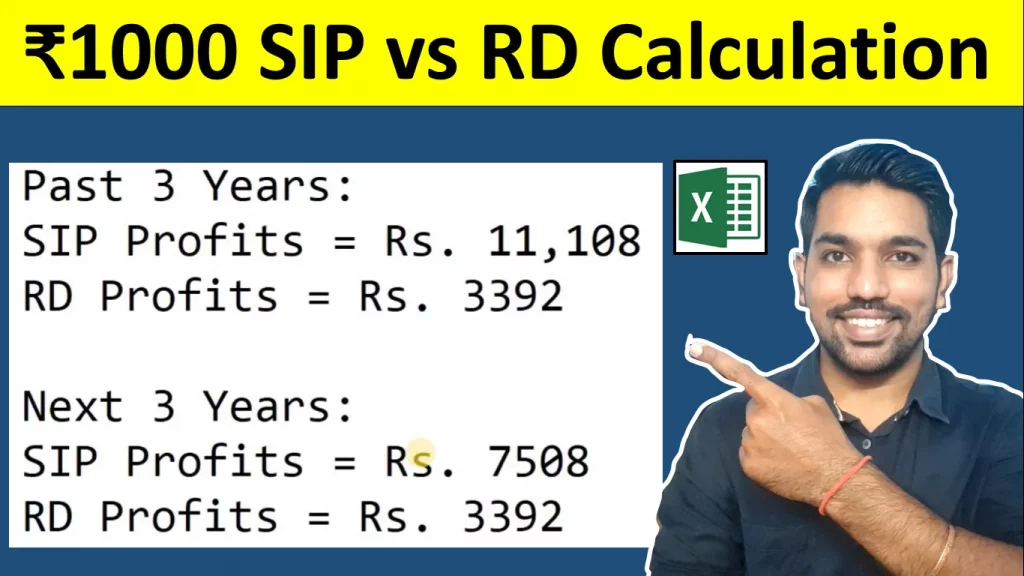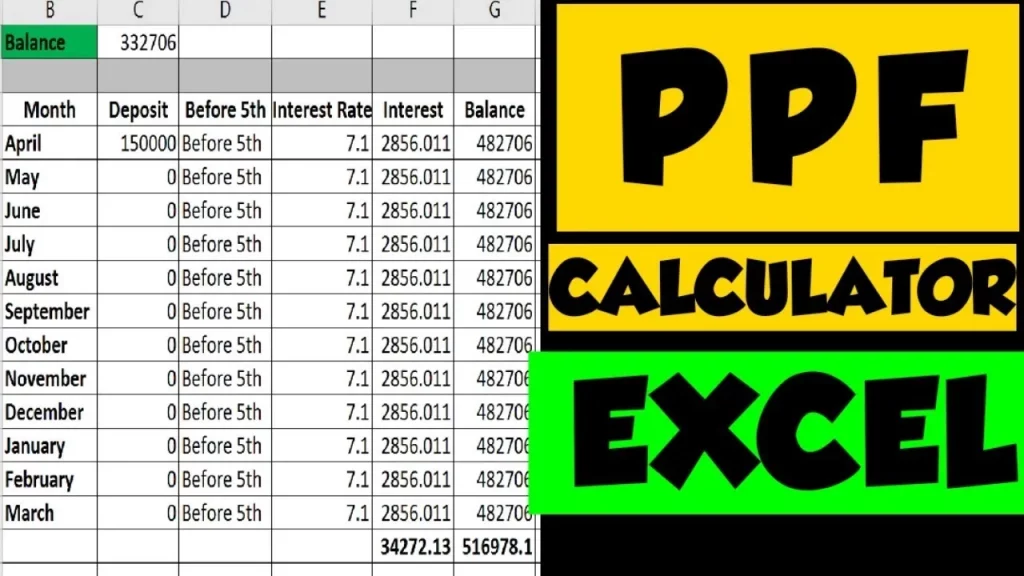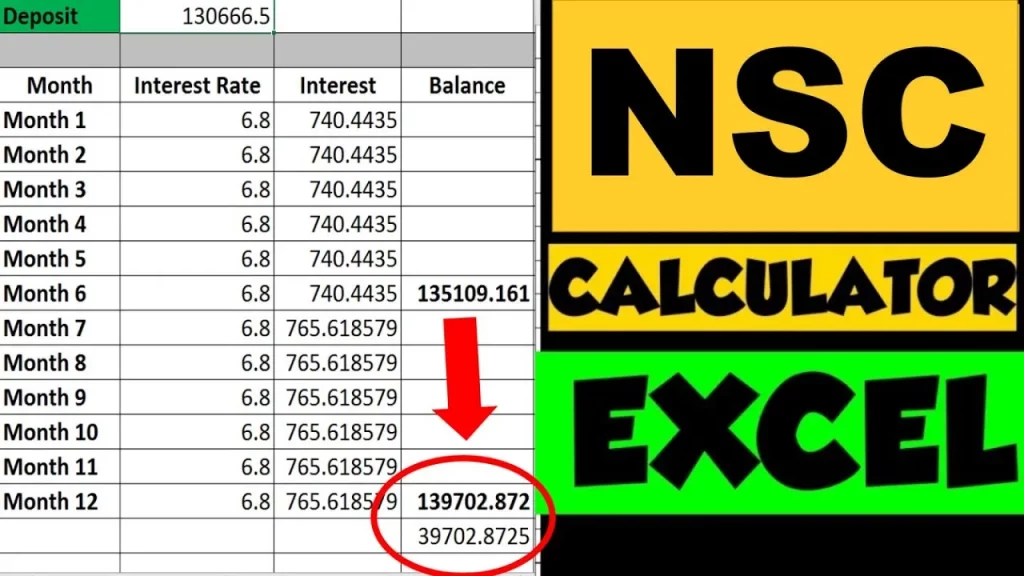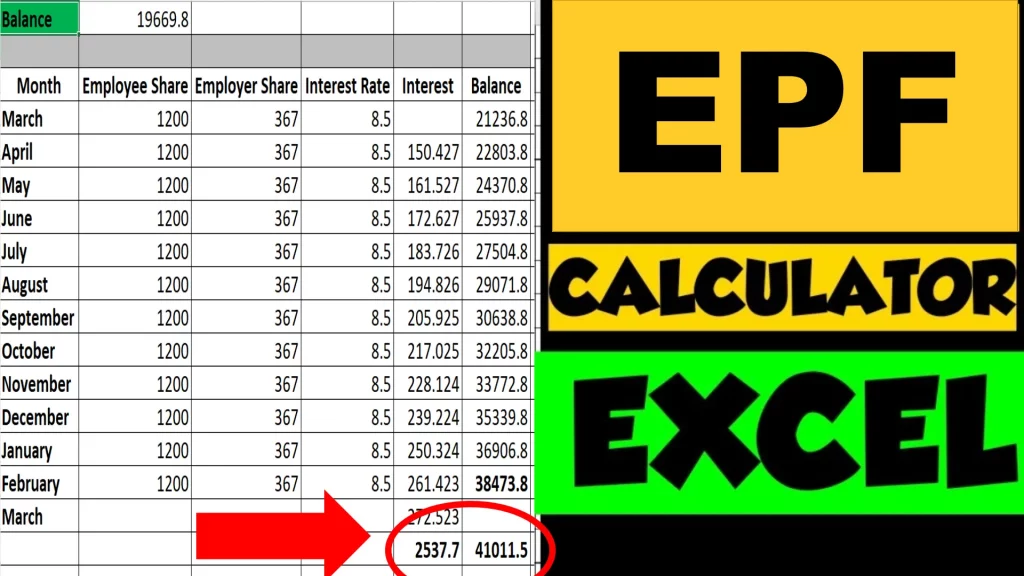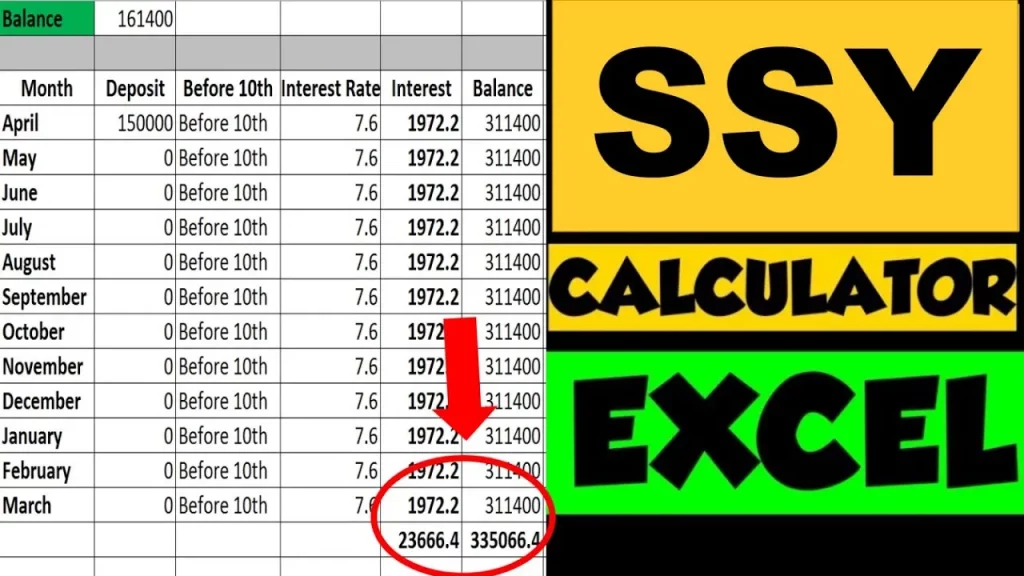We are going to see the comparison of Mutual Fund SIP vs RD Calculator in this post that will help you decide what to choose between SIP and RD and which is better option to achieve your financial goals.
SIP is best when your financial goal is for long term of at least 7 to 10 years. For short terms goals of 6 months to 3 years, you should use RD or Recurring Deposit. Use this SIP Calculator to easily know your returns on monthly SIP (Systematic Investment Plan). A good expected rate of return in mutual fund via SIP will be 12% in a year. Use this RD calculator to know how much interest you can get in RD (Recurring Deposits). RD interest rates can range between 5% to 7% in a year.
Below is the comparison of returns on SIP and RD on Rs. 2000 deposits per month with 12% returns in SIP and 6% returns in RD:
SIP vs RD Returns Comparison
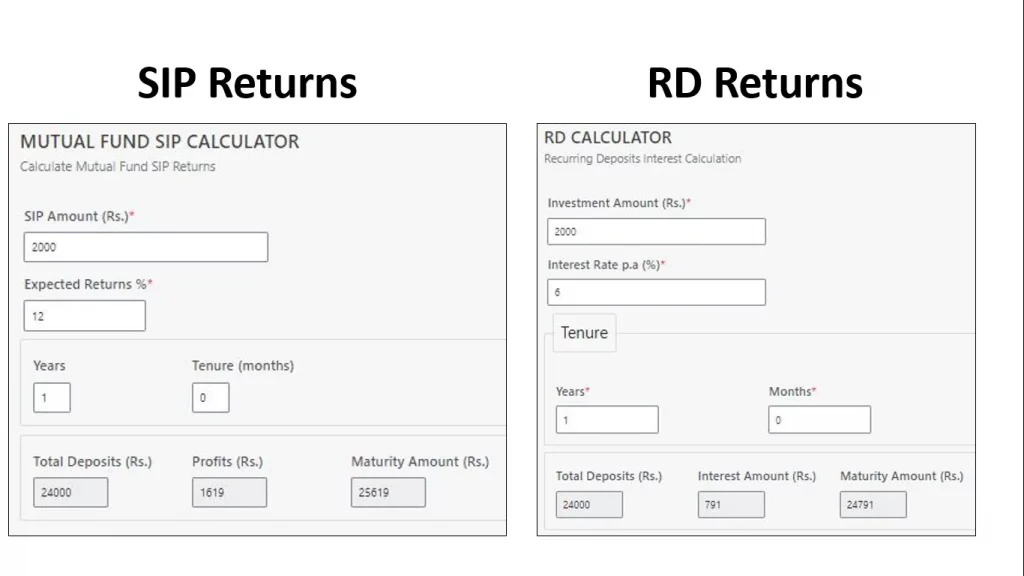
As seen above, we get Rs. 1619 profits in SIP over 1 year of deposits of Rs. 2000 and Rs. 791 profits in RD for same period and amount. The only difference is rate of returns which is considered as 12% in SIP and 6% in RD.
Note that RD returns are guaranteed once you open RD account in bank or post office, where as SIP return rate is not guaranteed and it depends on market condition. We can only assume the SIP return rate for calculation purpose but it need not be correct always.
SIP vs RD Calculator Video

Watch more Videos on YouTube Channel
In above video we have covered more examples of SIP vs RD calculator comparisons to give more idea about returns. It is not necessary that you’ll get less returns on RD always.
When market conditions are not good, you can get less returns in SIP as well in short term.
What is the difference between SIP and RD account?
Let us now understand the differences between SIP and RD account:
| SIP (Systematic Investment Plan) | RD (Recurring Deposit) |
|---|---|
| SIP full form is Systematic Investment Plan | RD full form is Recurring Deposit |
| SIP is a way to invest in mutual funds or stocks every month with a pre defined amount | RD helps you to save for your future goal by saving in Bank or Post office every month with a pre defined amount |
| SIP can be started online or offline | RD can also be started online or offline |
| SIP can be started with AMC (Asset management company) or via broker | RD can be booked in bank or post office |
| SIP investments are risky in short term | RD is not risky at all |
| SIP returns are not guaranteed. You can only see past returns of SIP and some other factors to invest in good mutual fund | RD returns are guaranteed, as interest rate is set and fixed during opening of RD account |
| We use SIP for long term goals – like 5-7 years at least | RD can be used for short term goals ranging from 6 months to 3 years |
| SIP returns for short term can be less compared to RD | RD interest are guaranteed |
| You can get more information on How to Start SIP online here | Get RD calculator in Excel here for offline calculations and interest details |
So above are some differences between SIP and RD.
Note that we start SIP for long term goals and time horizon must be at least 5-7 years while starting SIP. Where as for your short term goals of 6 months to 1 year, use RD.
When SIP can be started?
Below are some examples of goals when SIP can be started:
- Planning for your son or daughter’s marriage or education for which you have more than 10 years tenure – start Rs. 2000 SIP
- Planning to buy new house after 7 years – start Rs. 5000 SIP
- Buying a car after 5 years – start Rs. 3000 SIP
Above goals are the ones with long term horizon and sip can help us get better returns over long term. It is important to note that SIP amount should depend on your financial goal – the corpus you want to accumulate and the tenure you have planned for.
ALSO READ: SIP in Sensex for 25 Years
When RD can be started?
Let us now see some examples of goals when RD can be started:
- Buying a new smartphone after 6 months – start Rs. 2000 RD
- Saving to buy gold after 1 year – start Rs. 5000 RD
So above are some short term goals that you can achieve via RD.
Interest rates in SIP and RD
SIP rate of return can range between 10% to 15% over long term so we had assumed 12% return for calculation purpose. Since SIP returns depend on market conditions, we cannot predict the exact returns on SIP.
In short term like 6 months or 1 year, your principal amount deposited is also at risk as we have seen in the covid phase (between March 2020 to June 2020), but over long term, historically we have seen that we get better returns of around 10% to even 18% is some best mutual funds, when we see time horizon of 7 years to 10 years.
On the other hand RD interest rates can range between 5% to 7% based on the bank or post office you are investing in. RD interest rate is fixed during the time of opening the RD account, and hence we get guaranteed interests, irrespective of the conditions in the market.
ALSO READ: Rs. 1000 SIP Returns for 15 Years
Benefits and Disadvantages of SIP
Let us now see benefits and disadvantages of SIP:
Benefits of SIP
- Helps us to achieve long term goals of at least 5 to 7 years
- Can easily start SIP online
- Flexibility to start SIP directly with AMC or indirectly with broker
Disadvantages of SIP
- Not good returns over short term like 3 months to 6 months
- Risky in short term goals
- Charges levied on our investments via SIP in mutual funds, in the form of expense ratio
Benefits and Disadvantages of RD
Let us now see benefits and disadvantages of RD:
Benefits of RD
- Good option for short term goals
- Guaranteed returns on RD account
- Risk free option for short term savings
- Can be opened online via internet banking
Disadvantages of RD
- Less returns compared to SIP over long term
- Cannot accumulate sufficient amount for long term goals
- Post office RD can only be booked offline for now
ALSO READ: SIP vs Step up SIP Returns Calculation
SIP vs RD Which is Better?
Now the important question is Which is better between SIP and RD options? Where you should start investing or saving.
Short answer – for your long term goals of at least 5 years, use SIP investing to accumulate sufficient amount for your goal. SIP amount depends on your expected maturity amount in this case. And for your short term goals of 6 months to 2 years, open RD (Recurring Deposit) to save for your goal.
So SIP is better for your long term goals and RD is better for short term goals.
Rs. 2000 SIP Returns Calculation Video

Watch more Videos on YouTube Channel
Conclusion
We have seen the SIP vs RD Calculator and compared the results of both calculators. SIP in mutual funds are risky in short term so we must use RD for short term goals.
We must use SIP investing for long term goals of at least 5 years. Both SIP and RD can be opened online to achieve your financial goals.
Comment below which is your favorite investment option and how much investment you have started in these options to achieve your financial goals.
Some more Reading:
Save Home Loan Interest Amount!
Use Home Loan Excel Calculator that will help you to Save Interest Amount on Home Loan EMI.
Click below button to download Home Loan EMI and Prepayment Calculator in Excel:
Watch how Home Loan Calculator in Excel Works
Income Tax Calculator App – FinCalC
For Income Tax Calculation on your mobile device, you can Download my Android App “FinCalC” which I have developed for you to make your income tax calculation easy.
What you can do with this mobile App?
- Calculate Income Tax for new FY 2024-25 and previous FY 2023-24
- Enter estimated Investments to check income tax with Old and New Tax Regime
- Save income tax details and track regularly
- Know how much to invest more to save income tax
- More calculators including PPF, SIP returns, Savings account interest and lot more
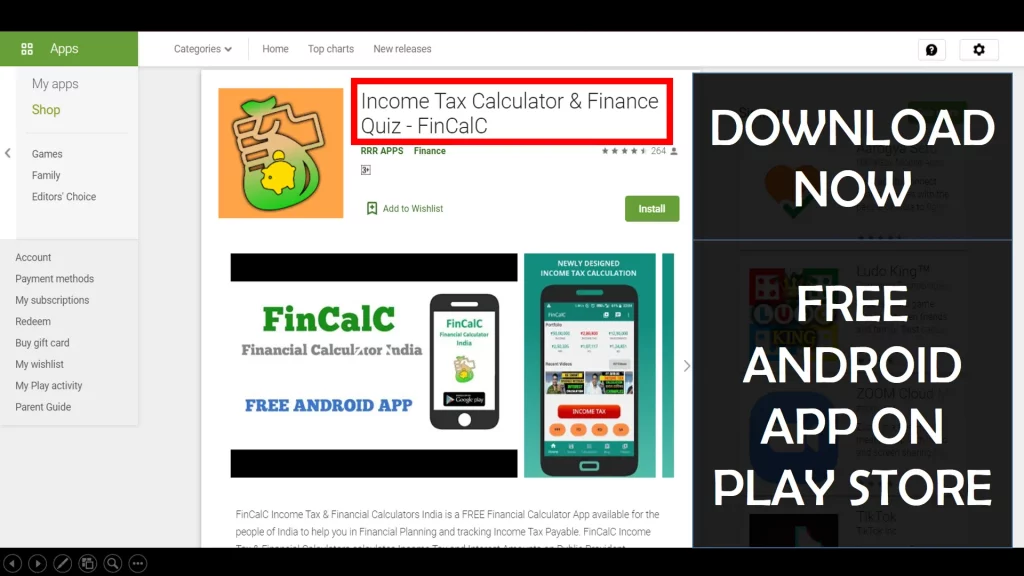
Use Popular Calculators:
- Income Tax Calculator
- Home Loan EMI Calculator
- SIP Calculator
- PPF Calculator
- HRA Calculator
- Step up SIP Calculator
- Savings Account Interest Calculator
- Lump sum Calculator
- FD Calculator
- RD Calculator
- Car Loan EMI Calculator
- Bike Loan EMI Calculator
- Sukanya Samriddhi Calculator
- Provident Fund Calculator
- Senior Citizen Savings Calculator
- NSC Calculator
- Monthly Income Scheme Calculator
- Mahila Samman Savings Calculator
- Systematic Withdrawal Calculator
- CAGR Calculator
I’d love to hear from you if you have any queries about Personal Finance and Money Management.
JOIN Telegram Group and stay updated with latest Personal Finance News and Topics.
Download our Free Android App – FinCalC to Calculate Income Tax and Interest on various small Saving Schemes in India including PPF, NSC, SIP and lot more.
Follow the Blog and Subscribe to YouTube Channel to stay updated about Personal Finance and Money Management topics.

